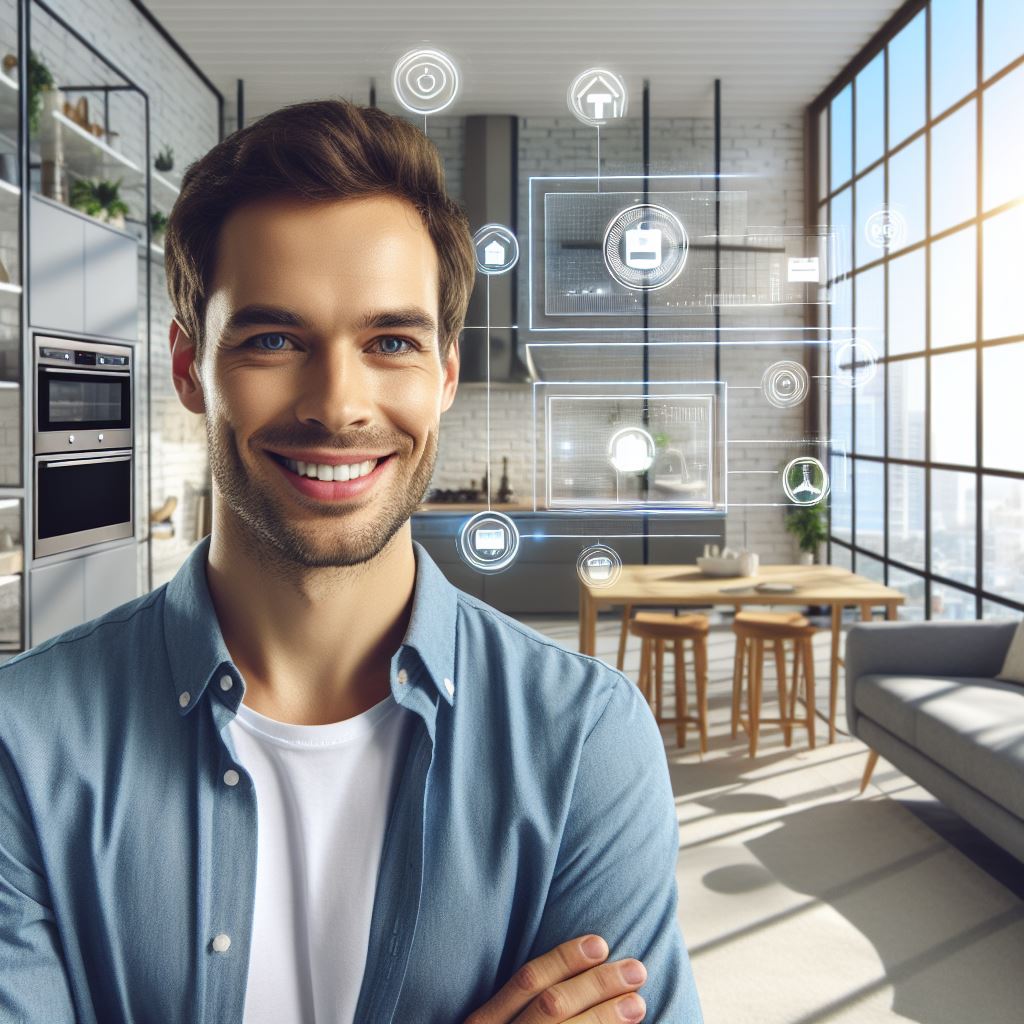Connected Homes: The New Standard in Real Estate
Last Updated on February 7, 2024
Introduction
Connected homes, also known as smart homes, have revolutionized the real estate industry.
These homes are equipped with advanced technology that allows homeowners to control various aspects of their house through a centralized system.
From remotely adjusting the thermostat to monitoring security cameras, connected homes are transforming the way we live.
With the rise of the Internet of Things (IoT), connected homes are becoming more accessible and affordable for homeowners.
This technology has gone beyond being a luxury and is now considered a standard feature in many new homes.
Homebuyers are increasingly attracted to the convenience and efficiency offered by connected homes.
The benefits of connected homes extend to both homeowners and the real estate market as a whole.
Homeowners can enjoy increased energy efficiency, cost savings, and enhanced security.
They can remotely control their home’s temperature, lighting, and even appliances, leading to reduced energy consumption and lower utility bills.
Additionally, the ability to monitor and manage security systems from anywhere provides homeowners with peace of mind.
The real estate market also benefits from the integration of connected homes.
These properties tend to have higher resale values and attract more potential buyers.
The demand for smart homes is steadily increasing, and properties that offer these features are highly sought after.
As a result, real estate agents are recognizing the importance of incorporating connected home technology into their listings, giving them a competitive edge in the market.
In essence, connected homes have become the new standard in real estate.
The convenience, efficiency, and security they offer make them highly desirable for both homeowners and the real estate market.
As technology continues to advance, it is expected that connected homes will become even more prevalent in the future.
What are Connected Homes?
Connected homes, also known as smart homes, are residences equipped with devices and systems that can be controlled remotely and work together to enhance the living experience.
This concept is revolutionizing the way we interact with our living spaces and is becoming the new standard in real estate.
The basic concept of connected homes
The basic concept of connected homes involves connecting various devices and systems through a central hub or network.
These devices can include appliances, lighting, heating and cooling systems, security cameras, and entertainment systems.
By integrating these components, homeowners can have complete control over their homes, even when they are away.
In connected homes, technologies such as Wi-Fi, Bluetooth, and Zigbee are used to establish communication between devices.
Wi-Fi enables devices to connect to the internet and be controlled remotely, while Bluetooth allows devices to communicate with each other within a short range.
Zigbee, on the other hand, is a wireless communication standard specifically designed for low-power devices in smart homes.
Various components and technologies used in connected homes
The components used in connected homes can vary depending on the needs and preferences of homeowners.
Some popular devices include smart thermostats, which can learn and adapt to the homeowner’s preferences, saving energy and providing comfort.
Smart lighting systems allow users to control and automate the lighting in their homes, creating ambiance and saving electricity.
Home security systems provide remote access to surveillance cameras and alert homeowners of any suspicious activities.
Connected homes also feature voice assistants, such as Amazon’s Alexa or Google Assistant, which act as the central control hub.
These assistants can be programmed to perform various tasks, from adjusting the temperature to playing music or even ordering groceries.
Popular connected home systems and devices
Examples of popular connected home systems and devices include:
- Amazon Echo: This voice-controlled smart speaker integrates with various devices in the home, allowing users to control lighting, appliances, and play music with simple voice commands.
- Google Nest: This ecosystem includes smart thermostats, cameras, and doorbells that can be controlled remotely through a mobile app.
It also offers features like facial recognition and video history. - Philips Hue: This smart lighting system allows users to control the color, brightness, and scheduling of their lights through a mobile app.
It can create different moods and even sync with music or movies. - Ring: This home security system includes video doorbells, cameras, and alarm systems.
Users can monitor their homes from anywhere and receive alerts when there is any detected motion or someone rings the doorbell.
Connected homes offer numerous benefits to homeowners. They provide convenience, energy savings, security, and comfort.
By integrating various devices and technologies, homeowners can have a seamless and personalized living experience.
In fact, connected homes are changing the real estate landscape by introducing a new standard of living.
As technology continues to advance, we can expect to see even more innovative and sophisticated connected home systems and devices.
Embracing this trend can enhance not only the functionality of our homes but also the overall quality of our lives.
Read: Smart Lighting: Setting the Mood and Value
Benefits of Connected Homes for Homeowners
In recent years, technology has made its way into our homes, transforming them into connected spaces that offer numerous benefits for homeowners.
The rise of connected homes has revolutionized the real estate industry, becoming the new standard in modern living.
Let’s explore the advantages of connected homes and how they enhance the homeowners’ lifestyle.
Improved convenience and comfort through automation
Connected homes allow homeowners to automate various tasks and processes, making daily life more convenient.
With the touch of a button or a voice command, you can control your lights, thermostat, entertainment systems, and more.
Imagine arriving home to a cozy, well-lit space with your favorite music playing.
Enhanced security features and remote monitoring capabilities
Connected homes provide homeowners with advanced security features, such as smart locks, surveillance cameras, and motion sensors.
These devices can be monitored remotely, allowing homeowners to keep an eye on their property from anywhere in the world.
They offer peace of mind and ensure the safety of your loved ones and belongings.
Energy savings and increased efficiency
One of the significant advantages of connected homes is the potential for energy savings.
Smart thermostats learn your preferences and adjust the temperature accordingly, optimizing energy consumption.
Connected appliances and lighting systems can be programmed to turn off when not in use, reducing wastage.
These smart features translate into lower utility bills and a more sustainable lifestyle.
Integration with smart devices and personal assistants
Connected homes seamlessly integrate with smart devices and personal assistants, such as smartphones, tablets, and voice-controlled speakers.
Through these devices, homeowners can easily manage and control various aspects of their homes.
Whether it’s ordering groceries, adjusting the temperature, or turning on the security system, the possibilities are endless.
Potential for increased property value
Investing in a connected home can add value to your property.
With the growing popularity of smart home technology, potential buyers are increasingly looking for homes with these features.
By incorporating connected devices into your home, you not only enhance your living experience but also make your property more appealing to potential buyers.
In short, connected homes offer numerous benefits, ranging from improved convenience and comfort to enhanced security and energy savings.
The integration of smart devices and personal assistants further enhances the homeowners’ control over their living spaces.
Moreover, investing in a connected home can potentially increase the property’s value.
Embracing the connected home trend is not just a passing fad but the new standard in real estate.
Read: Energy-Saving Tech: A Win for Homeowners
Impact of Connected Homes on the Real Estate Market
Increased demand for homes with connected features
The rise of connected homes has created a new trend in the real estate market.
Buyers are increasingly looking for homes that offer connected features and smart technology.
These features include appliances that can be controlled through a smartphone or voice commands.
As a result, homes with these connected features are experiencing a higher demand from potential buyers.
Influence on buyer preferences and market trends
Connected homes have influenced buyer preferences and shaped market trends in the real estate industry.
Buyers now prioritize homes that offer convenience and efficiency through connected features.
They value the ability to remotely control security systems, heating, and lighting, among other things.
This shift in preferences has led to a change in the market, with more developers incorporating connected features in new constructions.
Effect on home pricing and appraisal processes
The introduction of connected features in homes has impacted the pricing and appraisal processes.
Homes with connected features are valued higher due to their added convenience, security, and energy-saving capabilities.
Appraisers must consider these features when determining the value of a property.
As a result, connected homes tend to have higher appraised values compared to traditional homes.
Importance of real estate agents being knowledgeable about connected homes
Real estate agents need to be knowledgeable about connected homes to effectively serve their clients.
Buyers expect agents to understand the benefits and functionalities of connected features.
Agents who aren’t familiar with these technologies may struggle to attract and assist potential buyers.
Being informed about connected homes allows agents to provide valuable guidance and leverage selling points to close deals.
In today’s real estate market, connected homes are becoming the new standard.
The demand for homes with connected features is on the rise as buyers value convenience, efficiency, and security.
These features influence buyer preferences and shape market trends.
The introduction of connected features has also impacted the pricing and appraisal processes, with connected homes often being appraised higher.
Real estate agents need to stay knowledgeable about connected homes to effectively serve their clients and provide them with the information they need to make informed decisions.
In general, connected homes are revolutionizing the real estate market.
Homebuyers now prioritize convenience, efficiency, and security, leading to an increased demand for homes with connected features.
As technology advances, the influence of connected homes on the real estate market will only continue to grow.
Real estate professionals must stay informed and adapt to this new standard to meet the changing demands of buyers and successfully navigate the market.
Read: Voice Assistants: Revolutionizing Home Control

Considerations for Building or Buying a Connected Home
In today’s digital age, the concept of connected homes has become increasingly popular.
With advancements in technology, it is now possible to have a fully automated and interconnected home that offers convenience, efficiency, and security.
Whether you are considering building a connected home from scratch or buying an existing one, there are several important considerations to keep in mind.
Researching and Understanding Available Technologies and Systems
The first step in building or buying a connected home is to research and understand the available technologies and systems.
There are numerous options available, ranging from smart thermostats and lighting systems to whole-house automation systems.
It is important to determine which technologies and systems would best suit your needs and preferences.
An easy way to start your research is to read articles and reviews on various connected home technologies and systems.
Additionally, visiting showrooms and attending technology expos can provide you with a hands-on experience and help you make more informed decisions.
Assessing Compatibility and Scalability for Future Upgrades
When building or buying a connected home, it is crucial to assess compatibility and scalability for future upgrades.
Technology is continuously evolving, and it is important to ensure that the systems and technologies you choose can be easily upgraded or integrated with new ones in the future.
Compatibility is especially important if you plan on adding new devices or expanding your connected home system.
It is essential to check if the existing systems and technologies can seamlessly work with new additions.
Evaluating the Cost and Return on Investment
Connected homes can be a significant investment, so it is important to evaluate the cost and potential return on investment.
Consider the initial installation costs, ongoing maintenance expenses, and potential energy savings or increased home value.
While connected home technologies can improve energy efficiency and reduce utility bills, it is essential to calculate the expected savings and weigh them against the initial costs.
Additionally, consider if the potential increase in home value justifies the investment.
Considering Privacy and Security Concerns
Privacy and security are major concerns in a connected home.
As your home becomes increasingly connected, it is important to consider the privacy implications and take necessary steps to protect your personal data.
Ensure that the technologies and systems you choose prioritize data encryption, password protection, and secure communication protocols.
Additionally, consider using a secure network and regularly update the software and firmware of your connected devices to prevent potential security breaches.
Seeking Expert Advice and Assistance
Building or buying a connected home is a complex process that may require expert advice and assistance.
Consider consulting with professionals who specialize in connected home technologies or hiring an experienced builder or designer who has prior experience with such projects.
Experts can help you understand the intricacies of various technologies, recommend the most suitable systems for your needs, and ensure a smooth installation and setup process.
In review, building or buying a connected home entails careful consideration of available technologies, compatibility, cost, privacy, and security.
By conducting thorough research, evaluating potential returns on investment, and seeking expert advice, you can make well-informed decisions and create a connected home that enhances your daily life.
Read: Property Management Software for Large Portfolios
Challenges and Limitations of Connected Homes
In the era of modern advancements, connected homes have become the new standard in the real estate industry.
These homes are equipped with technologies that allow homeowners to control and automate various aspects of their living spaces, such as lighting, security systems, and temperature, through a centralized system.
While connected homes offer a plethora of benefits, they also bring along certain challenges and limitations that need to be addressed.
Dependence on reliable internet connectivity
One of the primary challenges of connected homes is their reliance on a stable and fast internet connection.
Without a reliable internet connection, the smart devices and systems in a connected home may become non-functional, turning the advanced features into mere inconveniences.
This limitation emphasizes the importance of having a strong internet connection to fully utilize the potential of a connected home.
Potential cybersecurity risks and privacy concerns
As connected homes are interconnected through the internet, they become vulnerable to cybersecurity risks.
Hackers can potentially gain unauthorized access to the network, compromising the privacy and security of the homeowners.
It is crucial to address these concerns through robust security measures, such as encrypted connections and regular software updates, to safeguard the connected home environment.
Compatibility issues among different systems and devices
The lack of standardization among various manufacturers and developers can lead to compatibility issues in connected homes.
Different smart devices and systems may not seamlessly integrate with each other, causing inconvenience and limited functionality.
The industry needs to focus on encouraging interoperability between different brands and ensuring compatibility among devices to provide a seamless experience for users.
Learning curve and technical know-how for users
For many homeowners, adapting to the technology of connected homes can be challenging.
Mastering the functionalities of a centralized control system and understanding the various features of connected devices require a learning curve.
Homeowners might need to invest time and effort into acquiring the necessary technical know-how to fully utilize the potential of their connected homes.
Limited availability and high costs of installation and maintenance
Connected homes are still a relatively new concept, and their availability and affordability are limited.
The cost of installing smart devices, systems, and infrastructure required for a connected home can be high, making it inaccessible to a significant portion of the population.
As the technology evolves and becomes more widespread, the costs are expected to decrease, making connected homes more accessible to everyone.
In a nutshell, connected homes provide a wide range of benefits for homeowners, including increased convenience, energy efficiency, and security.
However, challenges such as dependence on reliable internet connectivity, cybersecurity risks, compatibility issues, learning curve for users, and high costs of installation and maintenance need to be overcome.
As the real estate industry continues to embrace the concept of connected homes, addressing these challenges will play a crucial role in ensuring a seamless and secure experience for homeowners.
Conclusion
Connected homes have proven to bring numerous benefits and hold great significance in the real estate industry.
They offer convenience, increased security, energy efficiency, and cost savings. Moreover, they enhance the overall living experience for homeowners.
It is crucial for both homeowners and real estate professionals to embrace this technological trend.
Connected homes have become the new standard in the industry, and neglecting their potential can put individuals at a disadvantage.
By adopting connected home technology, homeowners can enjoy a modern lifestyle and gain a competitive edge in the real estate market.
Furthermore, the future holds even more exciting advancements in connected home technology.
As the Internet of Things continues to revolutionize various aspects of our lives, the possibilities for further innovation are endless.
We can expect improvements in automation, integration with smart devices, and the development of more efficient systems.
With these advancements, connected homes will become even more intuitive, allowing for seamless control and management of various household functions.
Homeowners can look forward to increased personalization, improved energy management, and enhanced connectivity with other devices in their lives.
Connected homes are here to stay, and their importance in the real estate industry cannot be ignored.
Homeowners and real estate professionals should actively embrace this trend to maximize the benefits it offers.
By keeping up with the latest advancements in connected home technology, individuals can stay on the cutting edge in today’s competitive market and shape the future of real estate.


